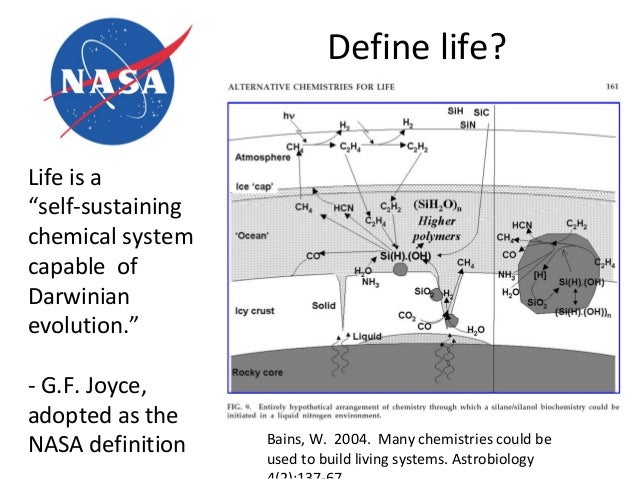NASA's Alternative Definition of Life - President's Dream Colloquium - Simon Fraser UniversityWhat is the definition of life? I remember a conference of the scientific elite that sought to answer that question. Is an enzyme alive? Is a virus alive? Is a cell alive? After many hours of launching promising balloons that defined life in a sentence, followed by equally conclusive punctures of these balloons, a solution seemed at hand: “The ability to reproduce—that is the essential characteristic of life,” said one statesman of science. Everyone nodded in agreement that the essential of a life was the ability to reproduce, until one small voice was heard. “Then one rabbit is dead. Two rabbits—a male and female—are alive but either one alone is dead.” - Daniel E Koshland,
The Seven Pillars of Life
Life's Great Mystery: What, Exactly, Is Life?
"We don't have a very good
definition of life," said researcher Christopher Voigt of the University of California, San Francisco, who works on
synthetic biology. "It's a very abstract thing, what we call life, and at what point we say something doesn't have the necessary components versus it does, it just becomes way too murky."
Life - Wikipedia
There is currently no consensus regarding the definition of life. One popular definition is that
organisms are
open systems that maintain
homeostasis, are composed of
cells, have a
life cycle, undergo
metabolism, can
grow,
adapt to their environment, respond to
stimuli,
reproduce and
evolve. However, several other definitions have been proposed, and there are some borderline cases of life, such as viruses or viroids.
There are over 100 definitions for 'life' and all are wrong
Nasa, for instance, has
described life as "a self-sustaining chemical system capable of Darwinian evolution".
But Nasa's is just one of many attempts to pin down all life with a simple description. In fact,
over 100 definitions of life have been proposed, with most focusing on a handful of key attributes such as replication and metabolism.
To make matters worse, different kinds of scientist have different ideas about what is truly necessary to define something as alive. While a chemist might say life boils down to certain molecules, a physicist might want to discuss thermodynamics.
For his part, Forterre thinks
viruses are alive, but he acknowledges that the decision really depends on where you decide to place the cut-off point.

